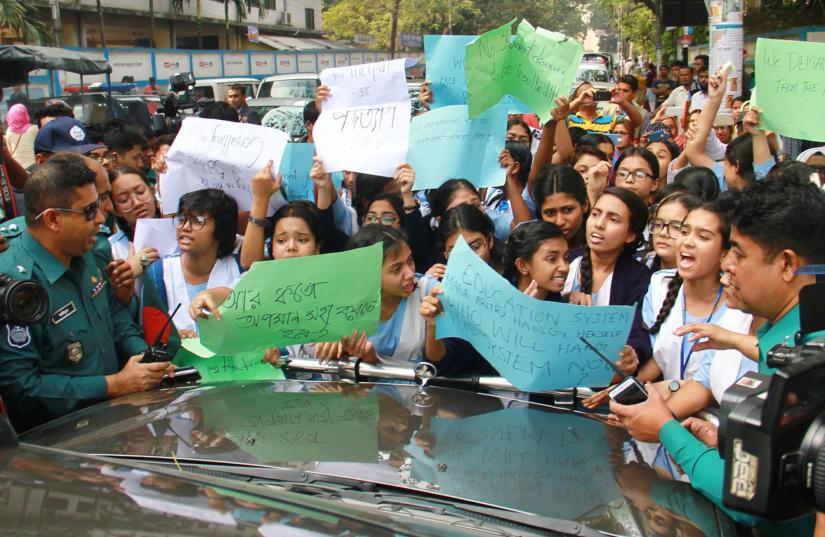 The social media has erupted in a furore over the suicide of a class nine student of Viqarunnisa School who was reportedly caught using a mobile phone during an exam.
The social media has erupted in a furore over the suicide of a class nine student of Viqarunnisa School who was reportedly caught using a mobile phone during an exam.
As per the report, the girl in question was found to be using the phone to aid her exam for which she was rebuked in front of her parents.
Now the first question that pops to mind is why she was allowed to take a phone in the exam hall? If the school has stringent regulations about phone usage inside exam centres then there should be proper checking before someone enters a test hall.
For argument’s sake, let’s assume the girl was cheating. There was no need to call her parents and reprimand her in front of them because a strict warning would have sent the message.
The girl, unable to take the humiliation in front of her guardians, went home and then took her life. We do not know if she was castigated by her agitated parents or not but as a common response to such situations, many parents in our country use a very common line: “I would rather die than cheat” or, to use the most used line, “Tomar More Jaoa Uchit” (you should die).
The line is uttered without any prior thought, but once someone decides to act on it, there’s very little someone can do to turn around the distressing result.
We were not present at the teacher’s room when the young girl was being censured severely for her conduct but this we can understand that in Bangladesh, with so much pressure on children to excel in everything, especially education, the breaking point is always hovering overhead.
Following the death, there has been a vociferous call for punishment but just taking punitive measures against a few won’t redress this deeply entrenched social anomaly.
We must understand child psychology and stop using children as objects to score social prestige points.
Why does everyone have to get the best grades?
The core defect of the pedagogical system is in the belief that a school going person’s only task is to produce the best academic result, irrespective of that person’s emotional turmoil or mental pressure.
While schools are locked in a battle to produce the best results and boast the tagline: we produce the highest number of star performers, parents are engaged in another social tug of war with their relatives and friends.
Caught in between are teenagers who are at a very delicate point of growing up. For the girl who took her own life, the breaking point was when the teacher in question refused to forgive her and reportedly carried on chastising her and her guardians.
Again, we can also guess what sort of language is used in such circumstances. Once a student is thoroughly decimated through verbal abuse, the anger is directed at the parents with the common line being used: “What sort of guardians are you and what kind of values do you instil in your children?”
That ‘holier than thou’ stance has several forms and the ultimate objective is to kill the parents and the child with a sense of overpowering shame.  Sorry to say, but many guardians take the revenge on their children for being reprimanded by the school authority.
Sorry to say, but many guardians take the revenge on their children for being reprimanded by the school authority.
In the end, the victim is the teenager or the child.
In current day Bangladesh, schools plus parents impose excessive pressure on children as if education is the only thing to live for. Of course, sparkling academic results are welcome but not everyone will be the best performer at school. That person may have talent elsewhere.
Please go and ask how many of the national team cricketers were top performers in school or college?
Or ask the same thing to Shakib Khan, arguably the highest grossing Dhallywood actor or all the other celluloid and media superstars who live in wealth, comfort and opulence?
Most celebrities have never gone to university, some did not even complete high school – and society is least bothered because they made their mark in their chosen fields.
Or look at it this way, someone who is average in education goes on to lead a moderate life in adulthood without much money or exalted social status.
Does that mean this person without a scintillating social presence has to be called a failure?
Child psychology is a must for parents, guardian and teachers
A deeply entrenched belief in our society is that unless one is academically brilliant, his/her future is bleak. And this is being enforced decade after decade by a profoundly defective social system.
A child should be allowed to grow up and show his/her potential and not be the medium of someone else’s wishes.
The common line used by adults in the past and still today while talking to children comes to mind: “What do you want to be when you grow up, a doctor, engineer, architect or a civil servant?”
This line may seem innocuous enough but the pressure it puts is deadly because, with this, an adult is reasserting that unless one aspires to be in one of the professions mentioned, life would be meaningless.
Interestingly, the majority of those who ask are often never in one of these professions either but when a child faces the same question over and over again, she/he feels a pressure to be in one of the professions highlighted.
Why can’t a teenager say, I want to be a sportsperson, a guitar player, an artist, a theatre actor or a writer with confidence?
Almost 80 percent of those who have made a mark in creative fields were never encouraged by their relatives. In the case of professional sports, nine out of ten established sportspersons will admit that at one point or the other, they were either beaten or berated by their parents and relatives for attaching too much importance to their game of preference.
In fact, a national cricketer, while giving an interview said that when his family took the marriage proposal to the girl he had always liked, they were turned down because the girl’s father was ambivalent about the future prospect of a cricketer. This happened when the player was already known across the country and was earning astronomical amounts from his club.
The social creed which glorifies academic brilliance compels many to relegate their creative pursuits or desires to fulfil the wishes of others.
The death of the child is but a result of this selfish dogma which we have nourished into a monster.
Child psychology has become essential at all schools and colleges because in this high-tech era growing up children are exposed to a variety of temptations plus exploitation.
Also, due to social taboo around sex, adolescent changes in thought, physique and outlook are never discussed comfortably creating an obscure phase which most people pass with countless jarring experiences.
Added to this comes the demand for academic performance. The deadly combination becomes too much for some.
In the end, parents, guardians and teachers remain alive, while the child is lost forever!
Towheed Feroze is a news editor at Bangla Tribune and teaches at the University of Dhaka.


